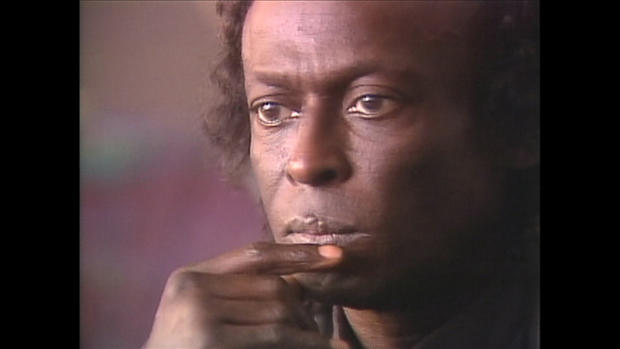Miles Davis honored with NYC street name
The City of New York unveiled "Miles Davis Way" this week, an Upper West Side street named in honor of one its most influential residents: late jazz great Miles Davis.
Miles Davis Way is located on West 77th Street between Riverside and West End Avenue-- the block where Davis lived for nearly 25 years before moving from the area in the mid-1980s. He died in 1991.
Davis' old residence happens to be blocks away from the 60 Minutes offices, so when news of his street dedication broke this week, we decided to check our archives to see if Davis and 60 Minutes had ever crossed paths. Sure enough, what we found is a fascinating and raw conversation between Davis and late correspondent Harry Reasoner.
Excerpts from the original story are posted in the above video player. The year is 1989 and Reasoner finds Davis relaxing at his beachfront home in Malibu, where the jazz musician discusses everything from "pimping" to how he kicked his drug addiction by locking himself in his father's house for five days.
When the conversation turns to race, neither Reasoner nor Davis shies away. At one point, Reasoner asks whether Davis believes black musicians are "genetically better" than white musicians. Davis says no but adds that "white musicians seem to lag behind the beat."
When Reasoner implies that blues and jazz talent in the black community stems from the suffering of slavery, Davis chuckles at the question and says, "It's not that "cliché." He shares a story from his teenage years about a music teacher he knew while attending The Julliard School:
"She started talking about, 'Well, you know, the black people was despondent at night and that's where the blues came from.' So I raised my hand. I said, 'Listen, my father's rich, my momma's good looking, and I can play the blues.' I've never suffered and don't intend to suffer."
Davis also offers a critique of American women and their penchant for drama, saying they "act like television."
In the 60 Minutes segment, Reasoner describes Davis as "anti-social," but Shirley Zafirau, Davis' former neighbor on West 77th Street, told 60 Minutes Overtime that wasn't the case.
Zafirau describes Davis as a "one-on-one" kind of man-- someone who always took the time to chat with his neighbors and ask, "Hey, how's it going?" One day in the late 1960s, while she was walking down the street on her way to work, Zifirau recalls that Davis pulled up alongside her in his sports car.
"Where's work?" she remembers him asking in his raspy voice.
"The Garment District," she told him and with that, he offered her a ride.
Zafirau says other people in the neighborhood had similar interactions with Davis, but it wasn't until she began working to obtain a tour-guide license that the idea of naming the street in his honor occurred to her.
Zafirau says that her studies and trips to Harlem, one of the epicenters of jazz, taught her that New York streets have been named for other well-known jazz musicians, including Duke Ellington.
"I'm saying to myself, 'Miles was such a part of his community, I don't believe his street hasn't been named for him.'"
According to Zafirau, West 77th Street churned out some memorable tunes, including music from some of Davis' most celebrated albums, "Kind of Blue" and "Bitches Brew." Zafirau says other jazz legends from Herbie Hancock to Dizzy Gillespie made their way to Davis' apartment to jam.
In 2009, Zafirau decided she would try to rename West 77th Street for Davis, and after five years of her efforts, Mayor Michael Bloomberg finally signed a bill last December officially renaming the block "Miles Davis Way."
Zafirau said she was shocked when hundreds of people showed up for the ceremony earlier this week, including Davis' former West 77th Street neighbors.
"I thought, 'Oh my God, this is amazing' and then I knew what I had done was the right thing to do."
Zafirau says her motivation was a combination of neighborhood pride and a hope that younger generations would learn about Davis and his music.
Davis would have turned 88 this week.
